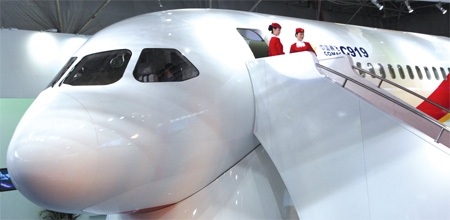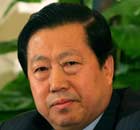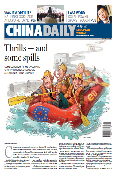Income gap, a woe for China and US
Updated: 2010-10-12 07:58
By Chen Weihua (China Daily)
The United States and China have found something in common lately, after the US Census Bureau announced that last year the income gap between the richest and poorest US citizens was the widest in recent history.
The top-earning 20 percent in the US, those making more than $100,000 a year, received 49.4 percent of all the income generated in the US, compared with the 3.4 percent received by those 14.3 percent Americans below the poverty line.
The ratio of 14.5-to-1 makes the US the country with the largest income gap in the Western industrialized world and represents a growing trend, as the ratio was 13.6 in 2008 and 7.69 in 1968.
The number of people falling below the poverty line last year was also the largest since the US Census started tracking poverty 51 years ago. About 14.3 percent, or 44 million Americans, were living below the poverty line in 2009.
With no quick economic recovery in sight, many fear these trends will continue in the coming years.
In China, the swiftly widening income gap has time and again sounded alarm. World Bank Chief Economist Justin Yifu Lin has warned that narrowing the income gap is the biggest challenge facing the country.
The current Gini coefficient of inequality in China is 0.47, its highest in the last 60 years. When China began its reform and opening-up in 1978 the Gini ratio was just 0.18 percent. The income disparity has widened along with its breakneck economic growth.
The top 1 percent of Chinese families now own 41.4 percent of the wealth, a figure similar to that in the US, where the top 1 percent control 40 percent of all the country's wealth.
In both countries, this extreme concentration of wealth and income is accused of hurting the economies.
Robert Reich, former US labor secretary and now a professor at University of California Berkeley, argued at a recent event to promote his new book, Aftershock: The next economy and America's future, that if a larger percentage of the people shared a bigger portion of the nation's wealth it would help generate more jobs and more economic growth.
The same argument was made by Li Peilin, head of the Institute of Sociology at the Chinese Academy of Social Sciences who attributed China's low domestic consumption to uneven income distribution. The spending power of middle and low income families is limited by the higher percentage of income spent on education and medical care, while the rich are investing much of their money in real estate, fuelling the housing bubble.
Though the causes for the huge income gap in the largest developed country and the largest developing country differ, the two countries have seen the same growing anger among the public.
In the US, the widening income gap last year was fuelled by the high unemployment rate, a struggling property market and shrinking but persistent debts, all of which hit low income families the hardest, and the rally of stocks and other securities, which benefited the wealthy. In China, the blame is placed on the decades-long rural and urban divide. Rural Chinese are left far behind in sharing the economic boom.
Among the urbanites, people accuse those working in monopoly industries, such as electric power, telecom, petrochemical, finance and tobacco for grabbing an unfair share of the nation's income. There is equal fury at profiteering industries such as real estate and mining. Of the 400 richest Chinese on the 2009 Forbes list, 154 were in the real estate sector.
In his study, Wang Xiaolu, deputy director of the China National Economic Research Institute of the China Reform Foundation, found that the top 10 percent of families have 65 times more per capita income than the bottom 10 percent, nearly three times the official statistics. The figures, still debated by some, have nevertheless provided a clue to the rampant rent-seeking activities in the country.
China and the US are becoming more like each other in the inequities of society. Narrowing the income gaps would not only aid their economic recoveries, but also bring social justice to their societies that are increasingly torn apart.
The author is China Daily's chief correspondent in New York. He can be reached at chenweihua@chinadaily.com.cn
Paper's Digest

Chinese jet takes on Big 2
First large commercial plane set to ride on demand for aircraft as economy grows.
Super-CPU only for domestic eyes
Specials

Chinese jet takes on Big 2
First large commercial plane set to ride on demand for aircraft as economy grows.

Gaining ground
Doing business in china for westerners has come a long way, Peter batey says.

Safeguarding environment a priority
China continues to face mounting pressure to curb environmental degradation, despite progress in reducing pollution over the last five years, the environmental protection minister warned.
